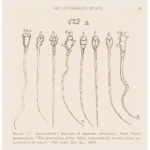Who would have thought that Wanda Ronner’s and my somewhat arcane expertise in theories of conception in the 18th century would strike a chord in national politics now, in 2012? Well, it just goes to show that as long as Republicans keep trying to turn the clock back on women’s rights, our research will never go out of style.
We have Representative Todd Akin, the Republican candidate for Senate in Missouri, to thank for our current relevance. Earlier this week, he espoused a theory of conception last viewed as credible back around the time of the American Revolution. As the whole world knows by now, he claimed in an interview that what he calls “legitimate rape” was very unlikely to result in pregnancy: “If it’s a legitimate rape, the female body has ways to try to shut that whole thing down.” Akin, a member of the House Committee on Science, Space, and Technology, seems not to have noticed that much has changed in science since 1776, which is about the last time that any serious medical thinker believed that in order for a woman to conceive, as we quote from the advice of the era in our book The Empty Cradle, “the womb must be in a state of delight.”
Of course, many women in the 18th century surely conceived even without such “delight,” but as Gail Collins quotes me in today’s New York Times, women weren’t asked whether the pronouncements made by male medical writers were true. Still, to give the men their due, they did advise husbands eager for offspring to make their wives happy in the marital bed. Men, they counseled, should neither force themselves on their wives nor neglect to satisfy them. As the most famous sex manual of the time put it, “Women rather choose to have a thing done well, than have it often. And in this case, to do it well and often too is inconsistent.”
But where did they get such an idea in the first place, and how in the world could anyone still hold it today? The second part of that question remains a mystery, but we can answer the first part: They got it from an idea prevalent in scientific circles before the discovery of sperm, which were first seen under a microscope towards the end of the 1600s. (Yes, we have to go back that far to find the “science” behind Representative Akin’s views.) In the 17th century, until Anton van Leeuwenhoek announced in the late 1670s that he had looked at semen under a microscope and seen tiny “animalcules,” the prevailing scientific thought about reproduction held that during orgasm men and women both emitted “seed,” and that the mixing of the male and female “seed” was necessary for pregnancy to occur. This idea, called the “semence” theory, was discredited by the discovery of sperm, but for another century or so medical advice givers continued to tell couples desiring children to seek mutual sexual satisfaction, mostly on the grounds that it couldn’t hurt and might help. After all, there was little else that could be done for infertility in that era, and such advice surely did no harm.
Since then pretty much all of us, although perhaps not Representative Akin and those from whom he seems to have gotten his information, have learned a lot more about reproductive biology. Today, with the new reproductive technologies, we don’t even need sexual intercourse, let alone a womb “in a state of delight,” for conception to occur. And we have also learned that more than 30,000 pregnancies a year occur as a result of the act of rape.
Representative Akin’s remarks caused a firestorm within the national Republican Party, many of whose leaders are calling for him to withdraw from his Senate race even as the party faithful are about to vote for an anti-abortion plank — one with no exception for women whose pregnancies result from rape or incest — in the Republican Party Platform. Akin argued that a woman who became pregnant as a result of a rape could not have really been raped and would force her to maintain the pregnancy. The Republicans voting in Tampa – and Paul Ryan, their Vice-Presidential candidate – would not deny she had been raped but they’d still not allow her to terminate the pregnancy. (The presidential candidate demurs, however. Mitt Romney would allow abortion in case of rape or incest or if the life of the mother were endangered.)
Last year, during the ultimately unsuccessful attempts by Republicans to eliminate federal funding for Planned Parenthood, it seemed as if the nation was about to retrogress to the early twentieth century, to just before the time when Margaret Sanger and her allies began their fight to legalize birth control. Now, it looks like we’re traveling backwards at least another century. If they weren’t so frightening – what’s next, repealing women’s right to vote? – these attempts to turn back the clock would almost seem funny.
 Sixteen years ago, a book by former Republican insider Tanya Melich urged Republicans to change their antifeminist stance. The Republican War Against Women argued that Republican policies since the era of Ronald Reagan increasingly undermined the rights of American women. Melich called on the party to change its divisive tactics. Clearly, the party did not listen, but that does not change the soundness of Melich’s analysis.
Sixteen years ago, a book by former Republican insider Tanya Melich urged Republicans to change their antifeminist stance. The Republican War Against Women argued that Republican policies since the era of Ronald Reagan increasingly undermined the rights of American women. Melich called on the party to change its divisive tactics. Clearly, the party did not listen, but that does not change the soundness of Melich’s analysis.

